Deaf Awareness Training

Image above: Demonstration of how captions work and the importance of caption unit placement on set
Stagetext is a deaf-led charity. We offer training to help venues and organisations to confidently communicate with customers who are deaf, deafened or hard of hearing.
All our training is designed and delivered by Stagetext staff who have a wide range of lived experience of deafness including wearing hearing aids, cochlear implants, are hard of hearing or have BSL as their first language. They understand first-hand the impact of accessibility on their enjoyment of arts and culture venues.
Although we are an arts and culture-based charity, we work with all venues and organisations across all sectors – whatever you need, we’re on hand to support you.
We offer:
-
Deaf Awareness Training
-
Digital Subtitles Training
-
Deaf Access in a Cultural Setting for Drama School Students
-
Bespoke Training – get in touch and let us know what you need
We tailor our training and support to your organisation and team, to ensure the training we deliver is useful and relevant to you and suits your budget.
The majority of our training sessions are delivered in person with a maximum group of 20 people, or they can be done online with a larger group.
Why choose Stagetext?
Our unique perspective comes from a range of lived experience within the charity. Stagetext staff have a wide range of lived experience of deafness including wearing hearing aids, cochlear implants, are hard of hearing or have BSL as their first language.
Not only do we understand the barriers faced by deaf, deafened or hard of hearing people, we’ve all worked within the arts, creative sectors and customer services industries and so are uniquely positioned to provide relevant and timely training and guidance.
Who we work with
We have trained thousands of people in the last few years and train industry professionals across a range of sectors and in different settings from theatres, museums, drama schools, libraries and charities.
We have worked with an extensive number of organisations within the arts, creative sectors and customer services industries and previous clients include the Mercury Theatre, New Diorama Theatre, Guildhall, RADA, LAMDA, Digital Culture Network, National Theatre, Regents Park Open Air Theatre and many more.
Mercury Theatre
Deaf Awareness Training
Did you know that 18 million people in the UK are deaf, deafened or hard of hearing? That’s 1 in 3 people.
We can help you and your organisation gain a better understanding of your deaf audiences and how simple access provisions make a positive difference to the customer experience.
We train Front of House and Box Office teams in advance of a captioned performance, so everyone knows what to expect, how to give the best customer experience and build brand loyalty.
These are great training session for theatres, museums, art galleries and other cultural venues.
Although we are an arts and culture-based charity, we work with all organisations across all sectors and tailor all our training to suit your organisation and your staff – whichever sector you work in.
We also have an enthusiastic group of ambassadors who are always happy to help your venue be more deaf aware.
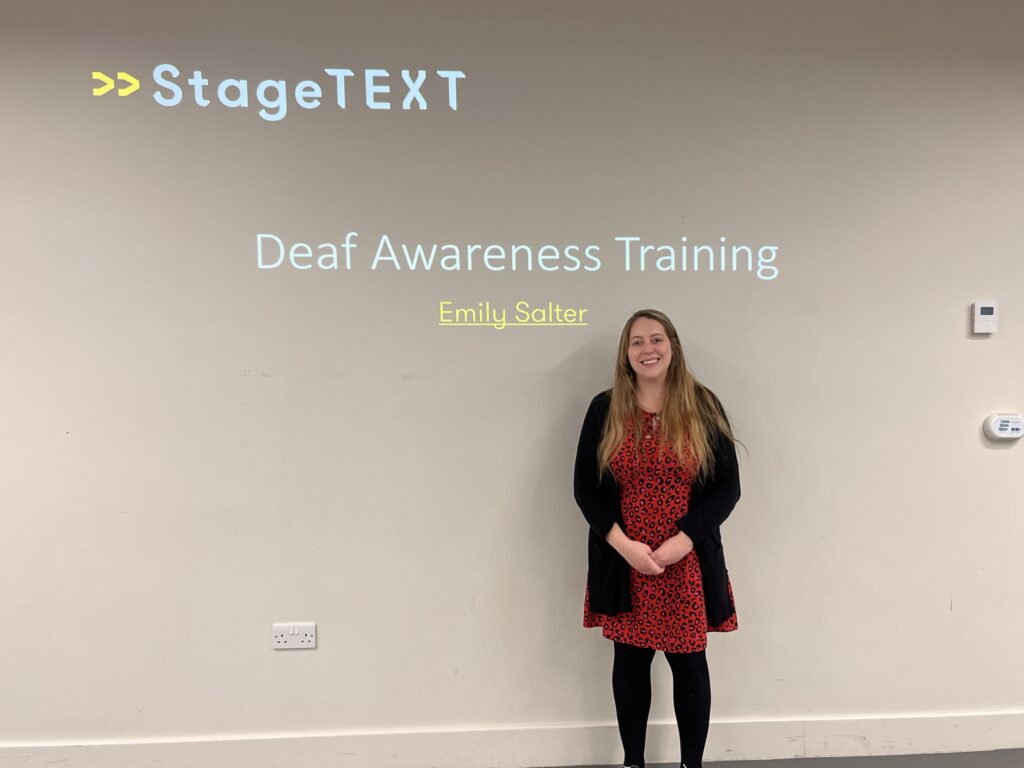
Introduction to Deaf Awareness Training – 2 hours
The Introduction to Deaf Awareness training benefits anyone who wants to learn how to confidently communicate with people who are deaf, deafened or hard of hearing.
We will cover:
- Why deaf awareness is important
- Statistics of deafness in the UK
- Terminology and different types of deafness including D/deaf, deafened and hard of hearing
- Communication strategies for staff speaking to deaf customers
- Hints and tips on removing communication barriers such as in noisy environments or dimly lit areas
- Interactive BSL fingerspelling and lip-reading exercises
- An overview of text-based deaf access – theatre captioning, live subtitles and digital subtitles and how they are used
2 hours, £300 + expenses + VAT
Deaf Awareness Training and Deaf Access Best Practice (one day)
A comprehensive session that helps you be more deaf aware and have a good understanding of deaf access. This training can be tailor-made to suit your venue and staff.
We will cover:
- Why deaf awareness is important
- Statistics of deafness in the UK
- Terminology and different types of deafness including D/deaf, deafened and hard of hearing
- Communication strategies for staff speaking to deaf customers
- Hints and tips on removing communication barriers such as in noisy environments or dimly lit areas
- An understanding of what your venue already offers (i.e. hearing loops, transcripts, captions, live subtitled events)
- Introduction to different types of text based deaf access available (theatre captions, live subtitles, digital subtitles) and how they are used
- Easy wins for deaf access
- How to advertise your deaf access to your customers
- Best practice for your venue’s front of house staff for deaf, deafened or hard of hearing customers
10am to 4pm, £995 + expenses + VAT
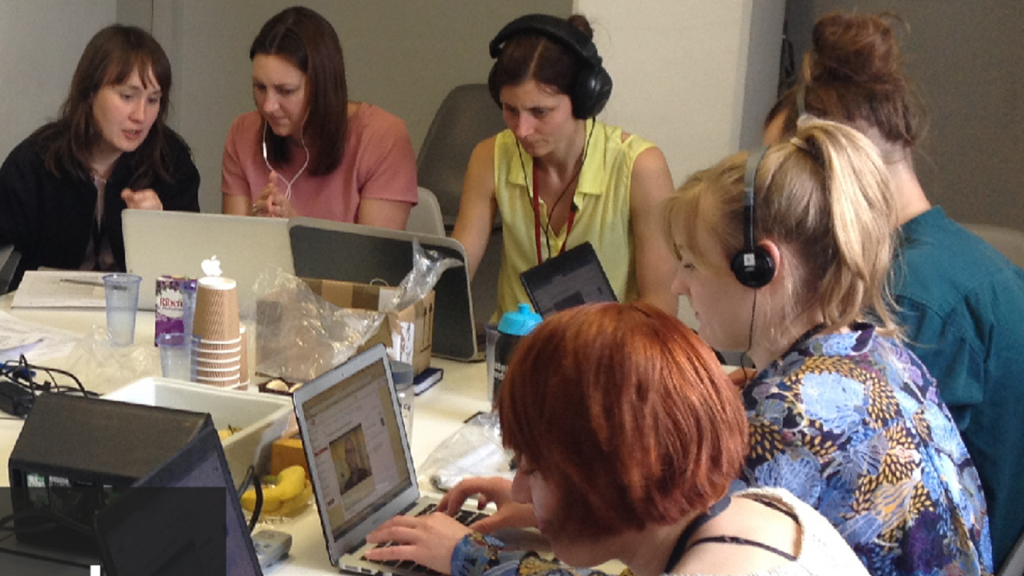
Digital Subtitles Training
Did you know that 24% of the general public have subtitles switched on all the time at home and a further 26% of them have them on some of the time?
This training focuses on the benefits of digital subtitles (video, VR, creative and online) to reach a wider range of audiences online including people who are neurodivergent or for whom English is a second language. It also covers tips and guidance on best practice on how to create deaf accessible subtitling.
Deaf Access Digital Subtitles Training – 3 hours
We will cover:
- Introduction to Deaf Awareness
- Benefits of subtitles – both to deaf audiences and other audiences
- How subtitles are used by viewers and their impact on user engagement
- How to get support for subtitling within your organisation
- Best practice for implementing subtitling as a policy within your organisation
- Best practice for creating deaf accessible subtitling – formatting text, how to deal with sound effects, music, multiple speakers, singing and timing.
3 hours, £600 + expenses + VAT (online: £450 + VAT for 2 hours)
Although we are an arts and culture-based charity, we work with all organisations across all sectors – whatever you need, we’re on hand to support you.
For more guidance on creating your own subtitles, check out our free webinars on YouTube.
Deaf access in a cultural setting for drama school students
Our training prepares your students for working in a professional theatre environment where a knowledge of accessibility will be an asset.
Whether the students are performers or learning about the technical or design side of theatre, we work with drama school students to teach the importance of deaf access within a cultural setting.
This includes understanding theatre captioning and other forms of deaf access on stage and behind the scenes. What does a captioned performance mean for actors and technicians? How can set design students create inclusive sets – what do they need to consider?
Through our work with drama schools, we help put accessibility at the heart of the creative process and at the forefront for the next generation of theatre practitioners.
We have worked with drama schools including Guildhall, RADA and LAMDA and offer bespoke training depending on your needs and budget.
Deaf Access in a Cultural Setting for Drama School Students – one day
This training involves a live demonstration from a professional captioner using a caption unit and gives students the opportunity to create and deliver a short excerpt of a captioned script.
We will cover:
- Why deaf awareness is important
- Statistics of deafness in the UK
- Terminology and different types of deafness including D/deaf, deafened and hard of hearing
- Benefits of theatre captions and subtitles – both to deaf audiences and other audiences
- Introduction to different types of theatre captions including creative captions
- Live demonstration of how captions work and the importance of caption unit placement on set
- Technical requirements and set up for captions in theatres
- Understanding the production process of including theatre captions for a performance
- How to approach set design to include captions
- Best practice for deaf access captions
- Budgeting for deaf access in production costs
- Live subtitles for events and using Speech-To-Text Reporters – how it works and what’s involved.
- Digital subtitles – how they are used by viewers and their impact on user engagement
One day, £995 + expenses + VAT
Please note: If you would like to find out more about live subtitles in an arts and culture setting, we can also arrange for this to be demonstrated as part of a training package. This requires a Speech-To-Text Reporter and relevant equipment and the cost will be reflected on booking.
Working with our sister charity VocalEyes we can also offer a joint Sensory Awareness Training Day. To find out more, get in touch using the form below.
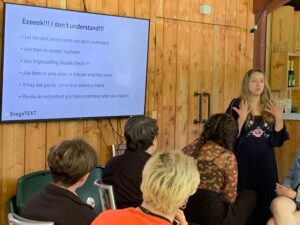
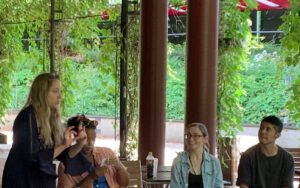
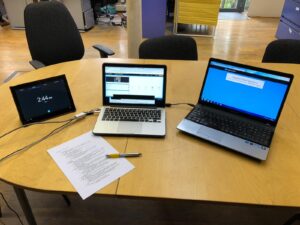
Guildhall School of Music & Drama
Contact Us
How can we help?
If you’d like to find out more about our training offers, please use the form to get in touch.
Drop us a line today and we can start organising the training that will best benefit you.
Whether you’re after Deaf Awareness Training, a guide on how you can start creating your own subtitles online, or would like to explore how we can help your drama students, we’re here to help.
No question too silly! We’re here to demystify all things deaf access.



